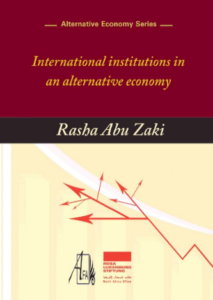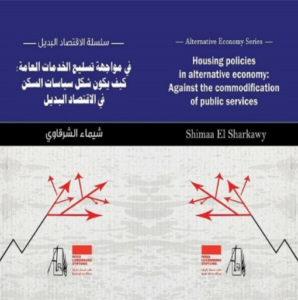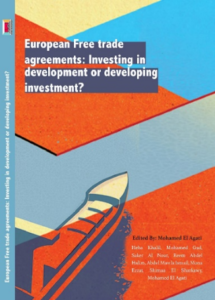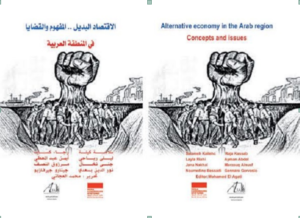 Loading...
Loading...
September 2023
The World Bank and its policies have a prolonged history in our region. Perhaps its first stop was in the year 1955 when the World Bank refused to finance Egypt’s construction of the High Dam, and the political events and developments that followed changed the face of the region. The role of the Bank and international financial institutions remained limited in certain countries in the region until its role began to expand through preliminary policies in the seventies and agendas and programs in the eighties. The following article published in Mada Masr monitors the development of these policies in the Egyptian case, which can be considered an example of what happened in our Arab region.1
“The Egyptian late journalist Ahmed Bahaa El-Din wrote on the front page of Al-Ahram (on 12th of July, 1974) an article entitled “Openness is not a “Topsy-Turvey” or Haphazard in other terms, in which he attacked Law No. 43 of 1974, which was issued by Abdel Aziz Hegazy, the Prime Minister back then, and required opening the door of the Egyptian economy to Arab and foreign capital in the form of direct investment, and although the content of Mr. Bahaa’s article was nothing more than a criticism of the style rather than the content, it was met with great anger from Sadat. However, after the events of 17th and 18th of January 1977, the authorities found their way to pass these laws under the pretext of the same approach and policies imposed by the International Monetary Fund and the World Bank. From openness to reform to structural adaptation to restructuring to privatization to devaluation, the names changed, while the policies remained the same. In the “Topsy-Turvey” of Abdul Aziz Hegazy, it was the lack of specialization of Mamdouh Salem that was the cause beyond the deteriorating economic situation, so he left in 1978, and Mustafa Khalil came to implement the policies in a more technical way, as proposed at the time, however development indicators declined and the exploitation of those with wealth and influence became the reason beyond that.
Atef Sedki came and left in 1996, blamed for corruption, and Al-Ganzouri took office for three years implementing the same policies. But the failure this time was due to the relatively slow implementation. When Atef Ebeid comes and rushes through policies, haste becomes the cause of economic deterioration. Thus, Ahmed Nazif comes to set the tone, but unfortunately, the involvement of businessmen makes the policies fail and prevents the fruits that they preached from falling. After 2011, Hisham Qandil comes to propose the same policies, but he fails because of the brotherhood, or so they said. Hence, Sherif Ismail comes, and the rally continues.
 Regrettably, for more than forty years, the question remained: Why do policies of international financial institutions fail? And not a single political regime thought about whether the problem was in the policies or in the system as a whole. One of the important conclusions of Thomas Piketty’s book “Capital in the Twenty-First Century,” the best-selling economic book in 2014, is that the capitalist system throughout its history led to accumulation in the same banks and that the fall of the fruits did not occur within the same societies. It can be confirmed from the experiences of implementing the procedures of the IMF and the World Bank that the lack of justice referred to within countries according to Piketty is the same as it applies to the international community, as accumulation occurs in the richest countries while the agenda of international financial institutions only makes developing countries poorer. This is not because of the speed of implementation, corruption, or efficiency, but rather because of the nature of the system itself, which is based primarily on the necessity of the existence of these classes, whether within the state or between states. Without unemployed people, it is not possible to provide cheap labor, and without poor countries, it is not possible to obtain cheap raw materials, for example. Therefore, the nature of the system maintains these gaps and even strengthens them and does not allow them to be overcome except when sometimes the system itself requires some changing for self-maintenance and crisis-response such as in the nature of the market or the arrangements of the international system, that is, mainly for subjective reasons. As for the countries that were able to take off in the twenty-first century, most notably the Latin American countries, they were not able to take off until they got rid of the restrictions of international financial institutions and their capitalist agenda. One of the jokes that were made at the beginning of the century in the Latin American countries that had long suffered from these prescriptions was that Mexico has succeeded in implementing the World Bank’s reform policies to the extent that it has repeated the same prescription three times. But it seems that the biggest tragedy they may see in our region is that countries have been implementing reform forever and ever.
Regrettably, for more than forty years, the question remained: Why do policies of international financial institutions fail? And not a single political regime thought about whether the problem was in the policies or in the system as a whole. One of the important conclusions of Thomas Piketty’s book “Capital in the Twenty-First Century,” the best-selling economic book in 2014, is that the capitalist system throughout its history led to accumulation in the same banks and that the fall of the fruits did not occur within the same societies. It can be confirmed from the experiences of implementing the procedures of the IMF and the World Bank that the lack of justice referred to within countries according to Piketty is the same as it applies to the international community, as accumulation occurs in the richest countries while the agenda of international financial institutions only makes developing countries poorer. This is not because of the speed of implementation, corruption, or efficiency, but rather because of the nature of the system itself, which is based primarily on the necessity of the existence of these classes, whether within the state or between states. Without unemployed people, it is not possible to provide cheap labor, and without poor countries, it is not possible to obtain cheap raw materials, for example. Therefore, the nature of the system maintains these gaps and even strengthens them and does not allow them to be overcome except when sometimes the system itself requires some changing for self-maintenance and crisis-response such as in the nature of the market or the arrangements of the international system, that is, mainly for subjective reasons. As for the countries that were able to take off in the twenty-first century, most notably the Latin American countries, they were not able to take off until they got rid of the restrictions of international financial institutions and their capitalist agenda. One of the jokes that were made at the beginning of the century in the Latin American countries that had long suffered from these prescriptions was that Mexico has succeeded in implementing the World Bank’s reform policies to the extent that it has repeated the same prescription three times. But it seems that the biggest tragedy they may see in our region is that countries have been implementing reform forever and ever.
On the other hand, with the global economic crisis in 2008, questions began to be raised about the success of the capitalist economic system, especially with its recurring crises, and many from within the capitalist movement and even from outside it tried to find answers to these questions. However, the overwhelming answer came through an acrobatic move by some of the current’s theorists by reviving the history of the Chicago School, and here we say reviving the history because the policies were already there. They have linked it to the policies of Reagan and Thatcher, even though they did not call for anything more than the application of the free market model, and then dressed these policies up as an economic crisis, ignoring the changes made by the Democrats after Reagan and the Labor Party after Thatcher. Thus, this type of capitalism, which they called neoliberalism, became the cause of the crisis instead of the capitalist system. Some Arabs liked to call these policies “Brutal liberalism”, using the title of Dr. Ramzi Zaki’s book, who, like Ahmed Bahaa El-Din in the issue of “Topsy Turvey” is innocent of this term, as brutality in his title was a description of capitalism and a conceptualization of the term.
Certainly, this model is the product of a research and intellectual effort under the auspices of major stakeholders in the world, including companies, states, and international institutions that benefit from the existing system. And when opponents dispute the claims of the capitalist system using the increasing rates of poverty around the world and the class gaps and unemployment rates, as well as decline of public services when left to the free market in the most capitalist countries, Supporters of the capitalist system introduce three arguments to promote their wares to solve the neoliberal crisis through capitalist measures, which are:
- Emphasizing the necessity of “realism” and accepting any problems resulting from the application of expert policies, such as the worsening imbalance in distribution of wealth, or the high unemployment rate, as a necessary human cost for “scientific” policies to succeed and not the result of social bias inherent in these scientific policies. itself. We have an example in justifying the effects of devaluating the Egyptian pound.
- Defining “technical safe zones” for experts alone that should not be handled upon by politicians. As soon as talk comes about issues of development or management of any economic matter, immediate referral is made to the opinion of technocrats. In fact, many developments in the past decades have led to removing technical decisions – in economic matters – from the circle of political supervision (for example: the trend towards increasing “independence” of central banks, or the transfer of economic decision-making in many developing countries from parliaments to “specialized” executive bodies), In some cases, it reached the point of subjecting political action and all societal affairs to considerations of economic efficiency in its narrow technical sense (this sometimes reached crude levels in some Latin American countries when parliaments were dissolved on the grounds that they were making economically irrational decisions). We see this as completely consistent with ignoring the IMF loan proposal to the Egyptian Parliament.
 Depicting social conditions in “traditional societies” as having a natural and eternal existence. The disparity in land ownership, for example, finds its origins in the phenomenon of individual ownership of land, which is a natural phenomenon that has existed since ancient times. The conditions of rural society in Egypt, for example, have not changed for thousands of years, and they cannot change except with “scientific” intervention to implant the laws of modernization in this unmodernized place. This is the prevailing discourse regarding the monetary support system in Egypt.
Depicting social conditions in “traditional societies” as having a natural and eternal existence. The disparity in land ownership, for example, finds its origins in the phenomenon of individual ownership of land, which is a natural phenomenon that has existed since ancient times. The conditions of rural society in Egypt, for example, have not changed for thousands of years, and they cannot change except with “scientific” intervention to implant the laws of modernization in this unmodernized place. This is the prevailing discourse regarding the monetary support system in Egypt.
Between the demand for realism and the construction of safe technical zones, this tragic sequence that many Arab countries have experienced is happening in the beginning, the economic space is separated from any political, social, or moral considerations, given that economic issues are primarily of a technical nature, and then the economy is redefined. So that it is not viewed as one of the aspects of life, but rather, in the words of the famous economist Gary Becker, who won the Nobel Prize in 1992, as a scientific logic of thinking and a feasibility calculation that can be applied to all areas of life, and then it is projected onto all the issues of society so that they are all subject to profit and loss calculations, so that the circle is complete. Which begins with removing the economy from society’s control and ends with its return to domination over all of society’s capabilities.
With these three tricks, and under the slogan of neoliberalism, capitalism turns from a crisis into a solution. Instead of searching for alternative frameworks for capitalism, the solution becomes simpler and easier: abandoning neoliberalism and returning to rational capitalism. This seems as wise as rushing to close a window in the face of a thief who left the door open. Will the world ever think of closing the door in the face of the thief?
Hence, the issue is not a conspiracy, as some suggest, or as the supporters of these policies understand from the criticism directed at them. The flaw lies in the nature of these policies and the corruption of the system as a whole, and dealing with them, if necessary, must be within the framework of caution and diligence, not welcome, rush, and absolute faith in their approach.
In this context, this compilation presents what was issued by Arab Forum for Alternatives over the years of its work on the issue of international financial institutions and their impact on the Arab region, on two occasions: the first is the Forum’s celebrations of its fifteenth anniversary, and the second coincided with the holding of the annual meeting of the World Bank and the IMF in our Arab region, In Marrakesh in October 2023.
This compilation addresses the impact of the World Bank and other international financial institutions on our region through three aspects. The first analyzes the impact of these policies on the economies of our region in terms of debt, inflation, poverty and food, unemployment, and inequality. The second aspect turns to its impact on the status of socioeconomic rights in our region through the right to education, health, social security, the right to work, and adequate housing. The third aspect presents the repercussions of these policies on the most vulnerable groups such as women, workers, refugees, immigrants, and religious and ethnic minorities.
First Aspect: IFIs and economies of the Arab region: 
- Paper: Omar Samir Khalaf, International institutions and social justice in the Arab Spring countries,
- Paper: Rasha Abo Zaki, International institutions in an alternative economy,
Second Aspect: policies of IFIs and socioeconomic rights:
- Paper: Mohamed Elagati and Shorouk El Harery, COVID-19 and the crisis of democracy,

- Paper: Shimaa El Sharkawy, Housing policies in alternative economy: Against the commodification of public services,
- Paper: Gilbert Achcar, Sovereignty, and development,
Third Aspect: Repercussions of IFI’s policies on social categories: 
- Book: Mohamed Elagati (editor), European Free trade agreements: Investing in development or developing investment?
- Book: Mohamed Said Saadi et al, social disparities and class distinction in the Arab region,
Alternative thesis and visions:
- Paper: Wael Gamal, The Foundations of Alternative Economy, https://tinyurl.com/2d6fldvn
- B

ook: Salma Keilah et al, Alternative Economy in the Arab region “Concepts and Issues”, https://tinyurl.com/29u5p867
1 محمد العجاتي، من انفتاح السداح مداح إلى النيوليبرالية المتوحشة: تغيير الخطاب وثبات المضمون، مدى مصر، 8/12/2016: https://shorturl.at/cuAT0
